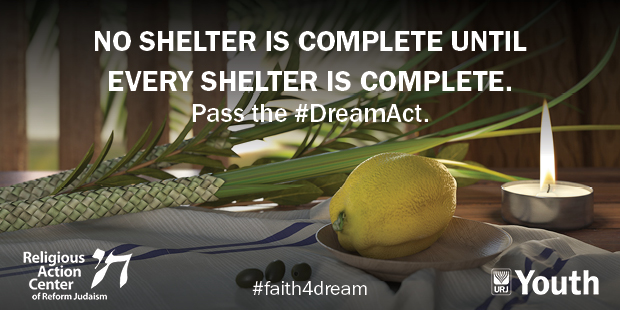
Sukkot, the celebration of bounty and harvest, is the plural of the word sukkah. A sukkah is a temporary structure, one we use to symbolize the frail huts in which the Israelites lived as they wandered in the desert—after leaving one home behind in search of a better life in another.
During Sukkot, we rejoice and offer thanks for God's protection of our people during an uncertain time in our history. This story reveals parallels with the situation of undocumented immigrants in the United States today, and in the example of protection and love set for us by God, we are given an indication of how we, too, should respond. Like the Jews of the Exodus generation, for the nearly 800,000 participants of the Deferred Action for Childhood Arrivals (DACA) program, the certainty of tomorrow is a luxury. There is a constant and evolving need for safety and shelter, especially against the very real threat of deportation from the only home most DACA participants have ever truly known.
The Hashkiveinu, often known to us as our bedtime prayer, is a prayer for peace. During it, we sing "Ufros aleinu sukkat shlomecha," spread over us Your sukkah of peace. Why does this prayer use the imagery of the sukkah, an intentionally temporary structure, when praying for our safety and protection? We believe it is because as Jews, we must always remember that no shelter is truly complete until every shelter is complete. The sukkah reminds us that rather than stay enclosed and shut away from the world, we must look outward at the world beyond our own lives.
On September 5, 2017, the Reform Movement condemned the Trump administration's decision to terminate the DACA program and since that time many of you have taken action to protest. In the spirit of Sukkot, the sukkah, and the larger Immigrant Justice Campaign, the Reform Movement is meeting the urgency of now by renewing and expanding these efforts. We are mobilizing throughout the country to pass a clean Dream Act of 2017, which would grant DACA recipients permanent residence status on a conditional basis and provide a pathway to citizenship for DREAMers who attend college, work in the U.S. or serve in the military.
We ask that you, as members of the Reform Movement, join us in this effort. You can do so in many ways, including:
- Using the ancient tradition of Sukkot to discuss the very current issue of immigration.
Use our Discussion Guide and Sukkah Sign to bring the conversation about the Dream Act into your personal, youth gathering, or congregational Sukkot observance. These resources are specially designed for all ages.
- Hosting or planning an Immigrant Justice Shabbat Observance with your congregation or community on November 3-4, 2017.
Whether or not you are able to facilitate a Shabbat observance on the weekend elected by the Movement, we hope you will review and use these resources to bring this conversation into your synagogue or community at some point.
- Participating in a national Reform Movement call-in day to push the Dream Act in Congress.
On the Monday after the Reform Movement Immigrant Justice Shabbat, we are calling upon the entire community to make calls to elected officials in their states and districts and make their support for the Dream Act known. More information to come in the coming days.
- Amplifying this effort on social media.
Starting Wednesday morning, the Reform Movement will begin sharing posts, stories, resources and calls to action on social media with the hashtag #ProtectDREAMers. To make the biggest impact, we must show our power in numbers. Please forward, retweet, and repost. Follow the RAC on Twitter and like the RAC on Facebook now to ensure this content crosses your path
- Sending a message to your elected official through the RAC website.
Visit rac.org/DreamAct to send a targeted email to your elected officials right now. Note: adding an anecdote or explanation of your interest in the issue makes these emails more compelling and personal.
We have an opportunity to harness our collective power, innovate within our Movement and demonstrate the depth of our commitment to social justice in North America. When we do this, when we act together, we move one step closer to building the world we want—one filled with wholeness, justice, and compassion.
P.S. In this tragic week, we also acknowledge how the festival of Sukkot speaks to frailty in our nation. Whether in communities severely damaged by recent hurricanes, or a nation broken and grieving over the senseless murders in Las Vegas, the sukkah—as frail as it may be—remains a strong and powerful symbol of hope and resolve to counter the brokenness in our nation.
For more information on this effort, please email Jacob Kraus.
Liz Cohen and Rabbi Charles Briskin are the Co-Chairs of the Urgency of Now Initiative Immigrant Justice Campaign.
Related Posts

Remarks from Rabbi Eliana Fischel at Jewish Gathering for Abortion Access

Teens from North Carolina Speak About Environmental Justice

